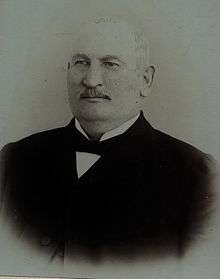Ion Ciocan
For the literary critic with a similar name, see Ion Ciocanu.
| Ion Ciocan | |
|---|---|
 | |
| Born |
February 19, 1850 Mocod |
| Died |
September 6, 1915 (aged 65) Budapest |
| Nationality |
Austrian Empire, Austro-Hungary |
| Ethnicity | Romanian |
| Alma mater | University of Budapest |
| Employer | University of Budapest |
| Religion | Romanian Greek-Catholic |
| Spouse(s) | Amalia Piciu |
| Parent(s) | Andrei Ciocan |
| Awards | Order of Franz Joseph |
Ion Ciocan (born February 19, 1850, Mocod - September 6, 1915, Budapest) was a politician and professor from Austro-Hungary. He served as member of the Parliament of Hungary (1896–1901, 1903–1915).[1]
Biography
Ion Ciocan was born on February 19, 1850, Mocod, then in the Austrian Empire. He graduated from the University of Budapest in 1874. He worked for Albina in Budapest (1874–1878) and after 1878 for a school from Năsăud. In 1886 became the president of the Fondurile şcolare năsăudene. He was a member of the Parliament of Hungary (1896–1901, 1903–1915). Also, Ion Ciocan taught Romanian language at the University of Budapest (1898–1909).[2]
Awards
- He received the cross of the Knights of the Order of Franz Joseph, 1890[1]
References
Bibliography
- Gavrilă Tomi, „Ion Ciocan. La 90 de ani de la trecerea sa în nefiinţă” în Arhiva Someşană, nr.4/2005
- Ioan Păcurariu, „Ion Ciocan. Viaţa, caracteristica, moartea şi funerariile lui”, în Raportul al LIII-lea despre gimnaziul superior fundaţional din Naszód-Năsăud pentru anul şcolar 1915-1916, publicat de: Ioan Gheţie, director gimnazial
- Katalin Kese, „Istoricul catedrei de Filologie română din Budapesta” in Tribuna, nr 17/1995
This article is issued from Wikipedia - version of the Monday, November 09, 2015. The text is available under the Creative Commons Attribution/Share Alike but additional terms may apply for the media files.